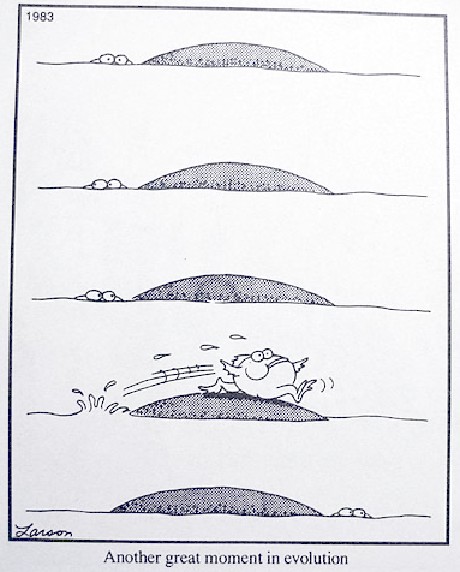The Integral Spiritual Center lands a come-on in my email box every week. Yesterday’s gave me a whack on the side of the head.
Modern science has given us a compelling picture of the evolution of our universe, from its first moments: quantum fluctuations—i.e. the “Big Bang”—led to a massive inflation, followed by “the dark ages,” then the formation of the first stars, at about t+400 million years. But science has been largely unable to explain what happened before—indeed, what brought about—the Big Bang. Scientific explanations have tended to end up sounding somewhat like traditional Eastern cosmology: the Earth stands upon the back of an elephant, which stands upon the back of a turtle, and from there, it’s turtles all the way down…. The world’s great spiritual traditions have long sought answers to this question, and have theorized a process reciprocal to the one that science has investigated so thoroughly: prior to evolution, there was involution.
Truth be told, I’m not aware of any spiritual tradition that has pondered what happened before the Big Bang. (This is the case if one discounts secular science enough to make of it not a spiritual tradition.) But the main thing is: the traditions didn’t know of the Big Bang.
Not so curiously, creation myths tend to be very relational and story-like! These stories have a beginning but don’t usually pose a beginning prior to their starting point. But the Big Bang doesn’t begin with the Big Bang. It’s a just-so story in the sense of ‘as far as we know’ and ‘to the degree that we know.’
The turtles all the way down trope certainly aligns with one of Ken Wilber’s oldest (surviving!) propositions, The Great Chain of Being. I’m not sure which scientific explanation was to the ISC’s blurb writer, “sounding somewhat like traditional Eastern cosmology.” (And this was stated after the same writer wrote: “science has been largely unable to explain what happened before.”)
The blurb seems to change the subject and goes on after raising Involution:
Essentially, says Ken, we begin every moment in a state of nondual Suchness. But if we have yet to stabilize that state into a state-stage, that state will be pre-conscious to us, and we will undergo the first contraction, into the causal realm of the Witness and all that is witnessed. If we have yet to stabilize that state, we will contract into the subtle realm of the soul. And if we have yet to stabilize that state, we will contract into the gross realm of the ego and our conventional self. So with every moment, we “fall down the stairs,” cascading down from suchness until the point of our state realization. Here, we recognize ourselves, in a dynamic similar to what the Tibetan Book of the Dead teaches about the Bardo and our experience after death. And this world (and with it, all “lower” worlds) arises in our experience.
Reminds me of Ibn al-Arabi, ra, and an encapsulation I wrote in 1991.
Henri Corbin commenting on the fact of ascension
(as described by Ibn’ Arabi, r.a.)
Look upon our own existance. Is it continuous ?
Or is it incessantly renewing on every breath ?
Does not being cease then come into being
with every breath, and upon His sigh of compassion?
Hexities, themselves pure possibles do not demand concrete existence.
recurrent creation manifests infinitely, essentially, divinely.
Divine being descends, is epiphanized in our individuality
such being thus ascends to return to the source.
Every being ascends with the instant
to see this is to see the multiple existing in the one.
And so the man who knows that is his “soul”,
such a man knows his Lord.
Richard Grossinger, from his superb new book, The Bardo of Waking Life:
The 9.5 years that it will take a spacecraft to bust out of Earth’s gravity well and be slingshot by gas giants to Pluto, out at the edge of the Kuiper Belt, must be measured against an event barely the size of a ball-bearing out of which the entire universe detonated once into a state so protracted and sticky it continues to fulminate and distend.
Involution? This reminds me of quaint and romantic notions from the hydraulic 19th century. Of course we’ve moved through the hyper-hydraulic 20th century. And past the cusp of the 21st century it seems contemporaneously quaint to suppose involution tended to reveal (Wilber’s) suchness is another turtle. We’re all enslaved for hundred thousand story-making years to this mechanical conceit.
“Before,” then, is only a mechanical necessity. What happens before you and your dear one decide to go out and dance? What is caused to morph?
Grossinger:
Our basis is completely mysterious. . .
Completely. It’s not that involution makes clear the origin, it’s that “pure possibles do not demand concrete existence” may require any origin to be essentially not knowable and, perhaps, origin exists beyond mere mechanics, beyond mechanical concretization of (even) original possibility.
Granted, Wilber is moved to try to explain everything. What a romantic!
Alternately:
What we call music in our everyday language is only a miniature, which our intelligence has grasped from that music or harmony of the whole universe which is working behind everything, and which is the source and origin of nature. It is because of this that the wise of all ages have considered music to be a sacred art. For in music the seer can see the picture of the whole universe; and the wise can interpret the secret and the nature of the working of the whole universe in the realm of music. Inayat Khan
Grossinger:
We are only possibility, and God is no one but the background agaisnt which possibility rests.
For me, ‘completely’ and ‘only’ tear involution and sunder suchness. Mystery cannot be the ground of mechanics and also itself mechanical. Before involution and evolution? Only God knows.



